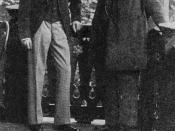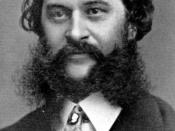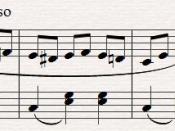The Era of the Waltz King
It was none other than the soulful, haunting melodies derived from the aura of the
most beautiful, romantic city in the world that inspired me to research into the history of
one of the most loved composers of all time. The king of Waltz is none other than Johann
Strauss Jr., who captivated and swept audiences of all ages into the irrestible passion for
dance. I have always been enchanted by the mesmerizing piece of music known as the
"Blue Danube" and have decided to broaden my knowledge on one of my favourite
composers of which who has composed approximately 550 fabulous pieces,
(Stevens,2004)
Johann Strauss was born on October 25, 1825 to Johann Strauss Sr. and Anna
Streim, (Hood,1996). He was one of the six children and the middle child born to the
couple. Johann Strauss Jr. was named in honour of his prestigious father (Hood,1996).
Johann's father was a severe drunkard who loathed his son's passion and skill for music.
His mother, Anna, a gifted guitarist in her husband's orchestra, secretly arranged for
Johann to learn from one of his father's orchestra conductors, Franz Ammon. Ammon
soon realized that despite his tedious efforts, the young Strauss's musical ability
surpassed his own. He recommended that Strauss Jr. learn from another talented
musician, (Fantel,pg ,Ebsco database ). His father meanwhile, on his rare visits was
agitated to discover that each time he arrived, Johann Strauss Jr. was getting better and
composing his own music. It must have startled his very jealous father to discover that
Johann Strauss Jr. had actually composed his first waltz at the mere age of six,( Ebsco
database).His father took it into his head to try to beat the music out of Johann by
whipping him brutally and forbidding Johann to play any form of music. Johann Strauss
the first and his son had an age gap of twenty-one years, (Fry,2001)His mother Anna
often intervened and stopped Johann Sr. from beating his little boy up so badly and
continued to encourage Johann to live up to his dreams. She was the role model that
shaped and changed Strauss's live forever, (Fantel, pg )
Johann Strauss did not have as happy as a childhood he hoped to have, as his
father was seldom at home. His father who was married once again, to a hideous
hat maker Emilie, packed his bags and left his former wife Anna on her own. Now Anna
had the task of raising her five legitimate children on her own, with the monthly income
of 500 Gulden. The family endured several hardships and Johann opted to stay with his
mom Anna and four siblings who needed his financial support and protection,(Fantel,pg )
Strauss's real music career started after his parents separated and he was thus
entitled to pursue his musical ambitions and career. It was through his music that Johann
Strauss managed to stay close to his father in his memories in his head,(Hood,1996). In
1844, at age19, Johann created his own orchestra and went on tour in Europe and North
America. His orchestras were usually small of about twenty six people, but could expand
to accommodate a hundred musicians, (January,2001)
Everyone in Vienna were devoted fans of the former Johann Strauss and it shocked them
to learn that Johann Jr. was attempting the unthinkable! Johann Straus Jr. was being so
bold as to rival his father in the very same trade, and capture the title of the Waltz King.
Johann Strauss made his debut at Dommayer's Casino where he was acknowledged for
his extraordinary skill, (Stevens,2004,Fantel pg ). At his debut, Johann was applauded
and asked to repeat one of his compositions four times. Everybody was there to criticize
and get a glimpse of the young musician who had challenged his very own father's
career, (Fantel,pg ).
Since the place was so packed the audience could not dance but could only listen
spell bound to the sweet tunes flowing out of the souls of the musicians that controlled
them. Even the ruffians, which his own father had hired to disrupt the performance, could
only gaze in appreciation and listen with rapture to the music that moved harmoniously
through everybody's ears. Hence, Johann Strauss stepped into the limelight to become
one of the most loved composers of classical music during the romantic era,(Fantel,pg )
At the time in Vienna, the music style that was the most dominant was the
waltzes. It was through the Waltzes that the social barriers were broken, aristocratic
pride set aside, and men and women could forget their worries and enjoy delightful music
and dancing that lifted their hearts and souls. With Johann Strauss's interpretation of
waltz music, a new tradition was brought forth in the way partners danced. The waltzes
were always conducted in three-four time and the waltzes that were lively, often made the
people lose their balance as they twirled in circles and grabbed the closest person,
(Hood,1996 Fantel pg ). This modern style was one of the many that helped transform
the mythical Vienna into one of the most beauteous, romantic cities in the world.
People of all ranks, nationalities and ages came to witness and be held ensnared
within the limitless boundaries of Johann Strauss's music. His fascinating melodies were
so popular that at a London concert a famous piece is reported to have been played a
record of thirty-eight times, (Fry,2001) Although Johann Strauss wrote many dance
compositions, he always maintained the belief that he could not dance. During his career,
Johann Strauss not only managed to produce waltzes, but polkas, gallops, quadrilles and
sixteen operettas,(Ebsco database).He was undoubtedly one of the first grand masters of
the opera. Strauss also managed to compose anywhere and everywhere. When
inspired, he use to write on napkins and on the shirt he was wearing, (Fry, 2001). One of
his most renowned compositions, the Blue Danube was composed on a shirt of his. Some
of his most famous works are the Blue Danube, the Viennese Waltz, Roses from the
South, Thunder and Lightning, Die Fledermaus and Tales from the Viennese woods,
(Ebsco database). It was obvious that his most famous pieces were all about his passion
for his beloved country that nourished his beliefs and harbored his interests and love.
One might say that Johann Strauss did grow up to be a bit like his father. He
married three times and had several children. He also played before several different
royalties and he also possessed the title of the "Waltz King." However, Johann Strauss
Jr. never felt hatred towards someone who in a way was better than him, (January,2001).
Later in life he was approached by the Director of Theatre, Ander Wien who
encouraged him to start writing operas. After several first attempts, Strauss composed a
dazzling piece of work that resulted in the exemplary masterpiece Die Fledermaus. This
piece had an outstanding libretto and an exquisite melody. It could probably be
considered to be the best of Strauss's career, (January,2001).
From my perspective, Johann Strauss not only brought fame to waltz but opened
the door to a whole new dimension of music that would be appreciated for a long time to
come. He was probably always pressurized by the feeling that the had to outdo himself
with every new composition. Johann Strauss Jr. has many societies dedicated to the
enhancement of his melancholic and spirited music and to the preservation of his
meaningful life. He was truly a musical genius with a passion for his significant work.
There is also no doubt that he managed to unite all people under the common
love- love of classical music. His symphonic waltz style formed the intricate patterns of
the soul in relation to the emphatic melodies that possessed men and women with the
feeling of bliss and the joy of dance. His persistence, memories and music will always
linger in his homeland Vienna and will always be unlocked when someone knowingly or
unknowingly begins to hum a part of the magical phrases of one of his five hundred and
fifty momentous works. To me Johann Strauss Jr. is a symbol of audacity and the holder
of the key to the most preeminent classical music of the romantic era.
References-
1) Fantel, H. (1972) Johann Strauss, Father & Son, and their Romantic Age. NewYork: William Morrow & Company Inc.
2) Fry, B. Classical Composer Biography-Johann Strauss .Retrieved April 3, 2004 from http://www.lessontutor.com/bf.strauss.html.
3) Hood, Kit.(Director).(1996). Strauss: The King of Three Quarter Time.[ Videocassette]. Sony Music Entertainment Inc, Devine Entertainment.
4) January, B. (2001, December 28). Johann Strauss biography. Retrieved April 5, 2004, from http://www.bob January.com/johann2.com
5) Johann Strauss (Waltz king), Monkeyshines on Music and Great musicians. (2001). Page 73. Retrieved April 1, 2004, from EBSCOhost database (Middle Search Plus).
6) Stevens, R. The Johann Strauss Society. Retrieved April 7, 2001, from http://www.johannstrauss.org.uk/


